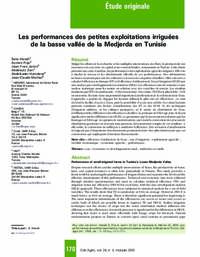Performance of small irrigated farms in Tunisia's Lower Medjerda Valley

Authors:
Despite research efforts and the multiple interventions of States, the productivity of water, land, and capital resources is often low, particularly in Tunisia. This study provides a framework for analyzing the performance of irrigated farms and examines the level and the effective determinants of this performance. Technical and economic data were collected through detailed questionnaires and used to calculate technical efficiency (TE) and irrigation water use efficiency (IWUE) for each farm, with the data envelopment analysis (DEA) approach. These efficiencies were subjected to statistical analysis for a set of field variables. The results show that TE is satisfactory at 0.84 on average. However, IWUE is much lower, at 0.61 on average. There is therefore significant potential for improving it. The most important determinants of the efficiencies are access to water and access to credit, both of which are possible levers to improve TE and IWUE. Neither irrigation techniques nor the choice of crops nor the water distribution method influence the differences in the efficiencies. Livestock presence is significant for the differences in IWUE, showing that water is used more efficiently with forage crops for livestock. Current modernization projects in Tunisia to convert open canal systems to pressurized pipe systems should take these results into account. But converting the irrigation system alone is not enough to improve efficiency. Scenarios that do not require such large investment may thus be more worthwhile.
